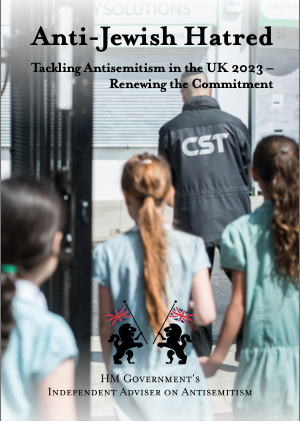Lord John Mann, the British government’s independent adviser on anti-Semitism published a report in December discussing progress made on tackling anti-Semitism. It also noted the rise of anti-Semitism and contained some recommendations on how best to address it. It included suggestions on tackling anti-Semitism in schools and in universities.
One of the most practical recommendations is that there should be a concerted knowledge-sharing exercise involving school heads and university vice-chancellors. Those who have made effective interventions should pass their insights on to others in their field. An overworked head of school or university vice-chancellor will be more prepared to act if someone provides them with hints as to a solution than if they just outline one more problem.
The report also recommends the development of new online resources explaining to academic staff how anti-Semitism manifests itself. At first sight it might be tempting to dismiss this as just an excuse to enable the anti-discrimination industry to earn more money generating yet more material.
However, in this instance it really does seem that this recommendation is useful. The report mentions that during the conflict between Hamas and Israel in May 2021 many school asked for guidance on how to deal with anti-Semitic incidents. Many phoned the Community Security Trust, a Jewish charitable organisation, for advice. Critics could ask why schools were not better prepared beforehand. However, at least those calls show that schools want to learn how best to proceed when faced with such incidents. If new online materials enable them to do that so much the better.
The report strikes a balance on the Boycott, Divestment and Sanctions (BDS) movement against Israel. It recognises that BDS is a legal political movement. At the same time it strongly recommends that academics should be free to pursue contact and joint research with their Israeli counterparts. This makes perfect sense. It is logically incoherent for academics to boycott other academics’ legitimate research. It also puts the quality of research carried out by those who indulge in such boycotts at risk.
It was both disappointing that universities had not built provision into their academic assessment arrangements for Jewish students who wished to observe Jewish festivals. The report mentions an instance where one student was told that they “would have to choose between being a serious scientist and an observant Jew”. Fortunately the report mentions universities which have got to grips with this issue (Oxford, Birmingham and Coventry receiving particular mention). However, it is hard to avoid asking whether a Muslim would be told to choose between being an observant Muslim and a serious scientist.
Ideally the report would have gone into greater depth discussing the culture in organisations such as the University and College Union (UCU). It refers to suspicions that the UCU might not be as wholehearted as it should be in tackling anti-Semitism. The report mentions David Miller, a professor at Bristol University until he was dismissed in 2021. His offence was accusing Jewish students of being part of a concerted attempt, coordinated by the Israeli government, to silence criticism of Israel.
It is worth asking whether the well-documented hostility towards Israel in some student bodies, and comments such as those made by Miller, are mutually reinforcing. This would suggested they increase anti-Semitism on campuses. A related question would be whether the National Education Union (NEU) pronouncements on the conflict between Israel and the Palestinians contribute to anti-Semitism in schools.
The problem underlying the discussion of cultures in trade unions in academia is anti-Semitism on the left. The report is aware that the stronger the anti-Israel feeling, the more likely it is to spill over into a more generalised hostility towards Jews. However, there is little discussion of how identity politics, with its notion of Jews as hyper-privileged, has legitimised the downplaying of the anti-Semitism’s importance.
Not surprisingly the report looks at Holocaust denial and distortion, particularly as it manifests itself on the internet. It notes that content which rehashes old anti-Semitic tropes and spreads falsehoods on the Holocaust is increasingly being accessed by young people. It also acknowledges that more needs to be known about why youngsters seem drawn to such material.
However it should be added that knowing about the Holocaust does not stop people from indulging in particularly repellent forms of anti-Semitism. University College London (UCL) has a centre dedicated to Holocaust teaching and research. Nevertheless, a demonstration on the Israeli/Palestinian conflict staged by some UCL students featured a banner with the words “there’s only one solution”, a vile pun on Hitler’s final solution. Something similar recently happened at George Washington University in Washington DC.
The most contentious recommendations of the report are those relating to adopting the International Holocaust Remembrance Alliance (IHRA) definition of anti-Semitism. There are also some disputed provisions of the online safety bill. These get into the thorny question of whether and how to regulate free speech. These will be discussed in a future article.
The views expressed in this article do not necessarily reflect those of the Radicalism of fools project.

